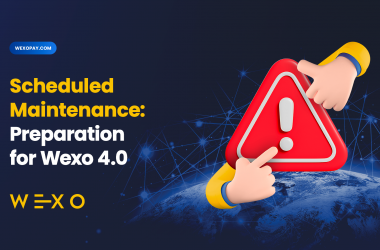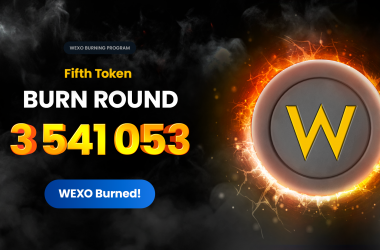Smart contracts: the perfect instrument for an evolving world?
DECENTRALIZATION DAO dApps DeFi PoS (Proof-of-Stake) SMART CONTRACT02-Dec-2021

TOP posts
Blockchain technology and its smart contracts will help us build a new and better world. Join us at the start of a future in which all industries will change thanks to this technology.
Many understand blockchain technology only as a transaction system used to transfer funds to a cryptocurrency. Yet smart contracts enable much wider use of this network. This is because it is possible to encode various information and conditions within data transactions under which data, such as contracts or operations, can be interpreted.
Trust is fine, but a smart contract actually offers security
The blockchain network is more about than cryptocurrencies and using digital coins to pay for latte in a café. Blockchain is here to fundamentally change the way this world works. Today, thanks to blockchain, you no longer need an intermediary as a guarantor of credibility to guarantee that a money transfer has taken place or that the terms of an agreement have been met.
Various agreements, conditions, and contracts can be resolved today thanks to smart contracts. These digital contracts, stored securely and permanently on a blockchain network, can replace classic paper contracts concluded between several parties and enforce them.
Smart contracts and their key features in brief:
- they're encrypted and use cryptography to prevent content being modified,
- they're transparent: everyone can see in blockchain the content and use,
- they don't need third-party verification - blockchain does it for us,
- they work autonomously and automatically: we don't have to wait for someone to approve something or "press the verification button",
- they are exact and precise: you do not need words interpreted, and thus avoid legal loopholes.
When the code is law
Smart contracts work automatically, without any intermediaries. In fact, it is a set of commands converted into source code. If predefined conditions are met, commands are executed automatically via a computer program, without the input of the parties involved.
This principle is older than blockchain or bitcoin itself, and is based on the basic condition of computer programming if/then - "if this happens, then do this". It is therefore a programmable protocol used to automate a contract, agreement, or conditions used not only to perform a transaction. As soon as such smart contract is concluded and sent to the network, it is immutable, irreversible, and cannot be modified.
How does it work?
To give you a better idea, we can imagine an agreement between a market seller and a farmer, who will conclude a smart contract based on blockchain. The agreement comprises the delivery of 100 kg of tomatoes on the last day of a month, with the farmer receiving XY money for these tomatoes. The seller locked the funds in a smart contract. So the farmer knows that the seller has enough money to buy, and thus avoids a potential problem with standard invoice maturity. But the funds will only be released to the farmer if he delivers the tomatoes on time. In the case of delay and non-delivery of the tomatoes by the farmer on the agreed date, this smart contract will be cancelled and the funds will be returned to the seller.
This example is a simplified demonstration of how smart contracts work. Their real benefit lies in more complex operations for large amounts. They are also used in banking, and retail systems and their automation. They could also replace government mandates and eliminate the need to resolve certain disagreements in court in the future.
Interesting Facts
Smart contracts were first described in 1994 by American computer expert Nick Szabo. Incidentally, this guy was also behind the creation of the first virtual currency (Bit Gold), hence speculation that he's also the anonymous inventor of bitcoin.
If we look at it from a more technical point of view, a smart contract must include several steps. First, we need at least two or more parties to enter into an agreement to perform a service or transaction. These parties also agree on the conditions under which the smart contract is considered concluded, and the transaction/service performed. All this information and conditions are stored in a smart contract, encrypted, and then stored in the blockchain network. After the operation is completed and all conditions are met, this transaction and its new state are recorded on the blockchain like any other.
Main benefits
As smart contracts operate on blockchain, they also ensure - in addition to the standard processes of this technology - security, efficiency, and speed.
Security
Smart Contract is distributed between network nodes. In practice, this means it cannot be lost and it is guaranteed that it cannot be changed or modified in any way.
Efficiency
Smart contracts can maximally eliminate the need for an intermediary - such as a bank, notary, or lawyer. So smart contracts save time, are economical, and can save money.
Speed
Automatic transactions are fast, accurate, and less prone to manual errors.
The human factor can be a fly in the soup
In the future practical application of smart contracts, their ambiguous legal status may be problematic. Legislation does not provide for anything like this at all, and implementation into laws and regulations will certainly be a judicial and legal challenge. The higher costs of implementing these smart contracts into existing systems can be an obstacle, and the human factor can also weigh significantly, for example in the form of misspelled code.
Ethereum as a pioneer of smart contracts
Smart contracts were especially popularized by Ethereum. The capabilities of the second largest blockchain have led to a number of decentralized DApps applications with a number of uses. Etherea's blockchain network was created for this purpose. Unlike most blockchain networks, which are described as a distributed ledger, Ethereum is considered a distributed state machine.
Alternative platforms that address the implementation of smart contracts include Cardano (ADA), Stellar (Lumens), and NEO.
In subsequent articles, we will take a closer look at the individual blockchains and platforms that offer smart contracts. We will also look at areas where smart contracts can create a significant revolution. You will also find interesting projects based on smart contracts at Wexo.



